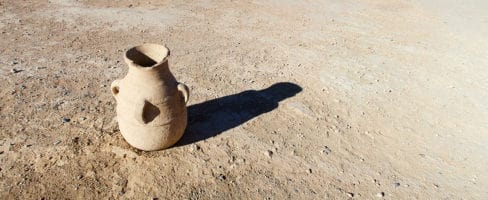Podcast: Play in new window | Download
Subscribe: RSS

Living Water
 What does Jesus mean when he speaks to the Samaritan woman at the well about “living water,” and what are the Old Testament roots of this imagery? Who were the Samaritans anyway, and why were they so despised by the Judeans of the first century? Finally, what can we learn from this text about sharing the gospel with others? On this edition of the program the hosts will discuss these issues and more as they begin chapter four of John’s Gospel.
What does Jesus mean when he speaks to the Samaritan woman at the well about “living water,” and what are the Old Testament roots of this imagery? Who were the Samaritans anyway, and why were they so despised by the Judeans of the first century? Finally, what can we learn from this text about sharing the gospel with others? On this edition of the program the hosts will discuss these issues and more as they begin chapter four of John’s Gospel.
Show Quote:
“That reminds me of Jeremiah 2. I think we referenced that a little bit earlier but, ‘Be appalled, O heavens, for my people have committed two evils: they have forsaken me, the fountain of living waters, and hewed out cisterns for themselves, broken cisterns that can hold no water.’ And just that reality that the thirst is there. There’s this desperate need for something and they think, “Okay, I need water so let me hew this and let me work hard. Let me work my hands to the bone to create this thing to maybe have some water.” And yet, they go to the wrong place. And that’s what Jesus is saying to the woman. You know you need water. This is intrinsic to you. As a human being, you know that need and that longing. I’m the source where it’s actually found.” – Patrick Crandall
Term to Learn:
“Holiness of God”
In general terms, holiness underscores the Creator-creature distinction. God is majestic, glorious, beyond reproach. In a certain sense, holiness characterizes all of God’s attributes. Yet, holiness typically refers in Scripture to God’s ethical purity, which is especially evident against the backdrop of human sinfulness. However, because of God’s mercy, God’s holiness not only highlights his difference from us; it also includes his movement toward us, binding us to him in covenant love. In this way, God makes us holy. Nevertheless, only in Christ can God’s holiness be for us a source of delight rather than of fear of judgment.
Therefore, God’s holiness is a marker not only of God’s distinction from the creation, but also God’s driving passion to make the whole earth his holy dwelling. Although God alone is essentially holy, he does not keep holiness to himself but spreads his fragrance throughout creation. God is holy in his essence; people, places, and things are made holy by God’s energies. (Adapted from Michael Horton, The Christian Faith: A Systematic Theology for Pilgrims on the Way, pp. 268–69)
(This podcast is by White Horse Inn. Discovered by Christian Podcast Central and our community — copyright is owned by the publisher, not Christian Podcast Central, and audio is streamed directly from their servers.)